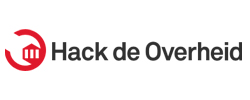Interview with Lex Slaghuis, organizer of Hack de Overheid
What is Hack de Overheid (hack the government)?
Hack de Overheid is an event where hackers, government officials and journalists come together to work with government data. Hack de Overheid thinks that at this moment there are a lot of government bodies who are not working with open data and are missing out on some very good ways to use this data.
Could you give an example?
I know someone who is a fireman. This fireman is at work waiting for the alarm to go off. When a fire is reported in the fireman gears up and heads towards the crisis situation as soon as possible. Before he can go to this location he needs to know the shortest route available and more importantly things like festivals, road repairs etc. are send by fax. The fireman doesn’t want to wait for information like this and asks the different authorities to email this information the next time. He then combines this data with maps and now it’s easier for him to reach his destination on time. The point I’m trying to make is about open data and this open data is not only interesting for civilians in the form of transparency but also for government bodies to better work together. These things can even create more companies, new policies and new forms of science based on open data.
Can you elaborate on open data and open government data?
With open data, programmers are able to combine data from different sources in a cheap and flexible way. By mixing this information it also creates new services and insights. The greatest benefits are the cheapness and the technical realisation is easier. By offering open data, information only one form, this means that owners lose less time on customizing for different kinds of software.
Government data is divided in two categories: data from services and data from political processes. These are worth releasing to the public, to create a better transparency and to let journalists work more accurate. Open data from government bodies can also create new applications inside the bodies themselves but more importantly within CSO’s and the private sector.
In what way does Hack de Overheid contribute in reaching these goals?
We are a collective of experts on open data en open data applications. On our events programmers, entrepreneurs, journalists and government officials work together in open data innovation.
What is your next event about and when can we expect it to happen?
Our next event is 26th of November and will be bigger and better than ever before. As part of the Apps voor Nederland (Apps for the Netherlands) competition we will bring our people together with people from a wide range of other fields, technical and non-technical. We want to hack on any relevant (open) data problems. During the day new datasets will be released and there will opportunities to work together during the workshops. We’ll have a few speakers as well and two have been confirmed: Matt Biddulph and Marius Watz. Matt has prgrammed pretty much everything under the sun and we are thrilled that he can participate and try out new stuff. Check out his website here. Marius Watz is an artist working on the synthesis of form as the product of parametric behaviors. His work is vivid and abstract and shows us how parameters and data can come alive. Check out his awesome work here.
How do you see the future of open data in the Netherlands?
The Netherlands has a rich tradition in open journalism and democracy. With the rise of the Internet and open data there are now new possibilities to give democracy a new meaning. For example the release of voting data can give both the public and the political bodies better insights on their voting habits and preferences. I think journalism is key here, by sharing knowledge, doing research and creating tools we hope to make this data more accessible and broader for everyone.
